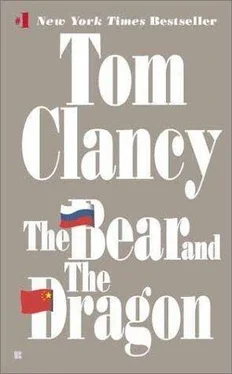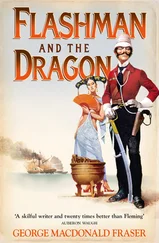Tom Clancy - The Bear and the Dragon
Здесь есть возможность читать онлайн «Tom Clancy - The Bear and the Dragon» весь текст электронной книги совершенно бесплатно (целиком полную версию без сокращений). В некоторых случаях можно слушать аудио, скачать через торрент в формате fb2 и присутствует краткое содержание. Год выпуска: 2001, ISBN: 2001, Жанр: Триллер, на английском языке. Описание произведения, (предисловие) а так же отзывы посетителей доступны на портале библиотеки ЛибКат.
- Название:The Bear and the Dragon
- Автор:
- Жанр:
- Год:2001
- ISBN:780425180969
- Рейтинг книги:3 / 5. Голосов: 1
-
Избранное:Добавить в избранное
- Отзывы:
-
Ваша оценка:
- 60
- 1
- 2
- 3
- 4
- 5
The Bear and the Dragon: краткое содержание, описание и аннотация
Предлагаем к чтению аннотацию, описание, краткое содержание или предисловие (зависит от того, что написал сам автор книги «The Bear and the Dragon»). Если вы не нашли необходимую информацию о книге — напишите в комментариях, мы постараемся отыскать её.
The Bear and the Dragon — читать онлайн бесплатно полную книгу (весь текст) целиком
Ниже представлен текст книги, разбитый по страницам. Система сохранения места последней прочитанной страницы, позволяет с удобством читать онлайн бесплатно книгу «The Bear and the Dragon», без необходимости каждый раз заново искать на чём Вы остановились. Поставьте закладку, и сможете в любой момент перейти на страницу, на которой закончили чтение.
Интервал:
Закладка:
“What about our civilians?” Bondarenko asked.
“They’re leaving the towns in the Chinese path as best they can, mainly cars and buses. We have MP units trying to keep them organized. So far nothing has happened to interfere with the evacuation,” Tolkunov said. “See, from this it looks as if they’re actually bypassing Belogorsk, just passing east of it with their reconnaissance elements.”
“That’s the smart move, isn’t it?” Bondarenko observed. “Their real objective is far to the north. Why slow down for anything? They don’t want land. They don’t want people. They want oil and gold. Capturing civilians will not make those objectives any easier to accomplish. If I were this Peng fellow, I would be worried about the extent of my drive north. Even unopposed, the natural obstacles are formidable, and defending his line of advance will be a beast of a problem.” Gennady paused. Why have any sympathy for this barbarian? His mission was to kill him and all his men, after all. But how? If even marching that far north was a problem-and it was-then how much harder would it be to strike through the same terrain with less-prepared troops? The tactical problems on both sides were the kind men in his profession did not welcome.
“General Bondarenko?” a foreign voice asked.
“Yes?” He turned to see a man dressed in an American flight suit.
“Sir, my name is Major Dan Tucker. I just flew in with a downlink for our Dark Star UAVs. Where do you want us to set up, sir?”
“Colonel Tolkunov? Major, this is my chief of intelligence.”
The American saluted sloppily, as air force people tended to do. “Howdy, Colonel.”
“How long to set up?”
The American was pleased that this Tolkunov’s English was better than his own Russian. “Less than an hour, sir.”
“This way.” The G-2 led him outside. “How good are your cameras?”
“Colonel, when a guy’s out taking a piss, you can see how big his dick is.”
Tolkunov figured that was typical American braggadocio, but it set him wondering.
Captain Feodor Il’ych Aleksandrov commanded the 265th Motor Rifle’s divisional reconnaissance element-the division was supposed to have a full battalion for this task, but he was all they had-and for that task he had eight of the new BRM reconnaissance tracks. These were evolutionary developments of the standard BMP infantry combat vehicle, upgraded with better automotive gear-more reliable engine and transmission systems-plus the best radios his country made. He reported directly to his divisional commander, and also, it seemed, to the theater intelligence coordinator, some colonel named Tolkunov. That chap, he’d discovered, was very concerned with his personal safety, always urging him to stay close-but not too close-not to be spotted, and to avoid combat of any type. His job, Tolkunov had told him at least once every two hours for the last day and a half, was to stay alive and to keep his eye on the advancing Chinese. He wasn’t supposed to so much as injure one little hair on their cute little Chink heads, just stay close enough that if they mumbled in their sleep, to copy down the names of the girl-friends they fucked in their dreams.
Aleksandrov was a young captain, only twenty-eight, and rakishly handsome, an athlete who ran for personal pleasure-and running, he told his men, was the best form of exercise for a soldier, especially a reconnaissance specialist. He had a driver, gunner, and radio operator for each of his tracks, plus three infantrymen whom he’d personally trained to be invisible.
The drill was for them to spend about half their time out of their vehicles, usually a good kilometer or so ahead of their Chinese counterparts, either behind trees or on their bellies, reporting back with monosyllabic comments on their portable radios, which were of Japanese manufacture. The men moved light, carrying only their rifles and two spare magazines, because they weren’t supposed to be seen or heard, and the truth was that Aleksandrov would have preferred to send them out unarmed, lest they be tempted to shoot someone out of patriotic anger. However, no soldier would ever stand for being sent out on a battlefield weaponless, and so he’d had to settle for ordering them out with bolts closed on empty chambers. The captain was usually out with his men, their BRM carriers hidden three hundred or so meters away in the trees.
In the past twenty-four hours, they’d become intimately familiar with their Chinese opponents. These were also trained and dedicated reconnaissance specialists, and they were pretty good at their jobs, or certainly appeared to be. They were also moving in tracked vehicles, and also spent a lot of their time on foot, ahead of their tracks, hiding behind trees and peering to the north, looking for Russian forces. The Russians had even started giving them names.
“It’s the gardener,” Sergeant Buikov said. That one liked touching trees and bushes, as though studying them for a college paper or something. The gardener was short and skinny, and looked like a twelve-year-old to the Russians. He seemed competent enough, carrying his rifle slung on his back, and using his binoculars often. He was a Chinese lieutenant, judging by his shoulderboards, probably commander of this platoon. He ordered his people around a lot, but didn’t mind taking the lead. So, he was probably conscientious. He is, therefore, the one we should kill first, Aleksandrov thought. Their BRM reconnaissance track had a fine 30-mm cannon that could reach out and turn the gardener into fertilizer from a thousand meters or so, but Captain Aleksandrov had forbidden it, worse luck, Buikov thought. He was from this area, a woodsman of sorts who’d hunted in the forests many times with his father, a lumber-jack. “We really ought to kill him.”
“Boris Yevgeniyevich, do you wish to alert the enemy to our presence?” Aleksandrov asked his sergeant.
“I suppose not, my captain, but the hunting season is-”
“-closed, Sergeant. The season is closed, and no, he is not a wolf that you can shoot for your own pleasure, and- down,” Aleksandrov ordered. The gardener was looking their way with his field glasses. Their faces were painted, and they had branches tucked into their field clothing to break up their outlines, but he was taking no chances. “They’ll be moving soon. Back to the track.”
The hardest part of their drill was to avoid leaving tracks for the Chinese to spot. Aleksandrov had “discussed” this with his drivers, threatening to shoot anyone who left a trail. (He knew he couldn’t do that, of course, but his men weren’t quite sure.) Their vehicles even had upgraded mufflers to reduce their sound signature. Every so often, the men who designed and built Russian military equipment got things right, and this was such a case. Besides, they didn’t crank their engines until they saw the Chinese doing the same. Aleksandrov looked up. Okay, the gardener was waving to those behind him, the wave that meant to bring their vehicles up. They were doing another leapfrog jump, with one section standing fast and providing over-watch cover for the next move, should something happen. He had no intention of making anything happen, but of course they couldn’t know that. Aleksandrov was surprised that they were maintaining their careful drill into the second day. They weren’t getting sloppy yet. He’d expected that, but it seemed that the Chinese were better drilled even than his expectations, and were assiduously following their written doctrine. Well, so was he.
“Move now, Captain?” Buikov asked.
“No, let’s sit still and watch. They ought to stop at that little ridge with the logging road. I want to see how predictable they are, Boris Yevgeniyevich.” But he did trigger his portable radio. “Stand by, they’re jumping again.”
Читать дальшеИнтервал:
Закладка:
Похожие книги на «The Bear and the Dragon»
Представляем Вашему вниманию похожие книги на «The Bear and the Dragon» списком для выбора. Мы отобрали схожую по названию и смыслу литературу в надежде предоставить читателям больше вариантов отыскать новые, интересные, ещё непрочитанные произведения.
Обсуждение, отзывы о книге «The Bear and the Dragon» и просто собственные мнения читателей. Оставьте ваши комментарии, напишите, что Вы думаете о произведении, его смысле или главных героях. Укажите что конкретно понравилось, а что нет, и почему Вы так считаете.






![Александр Ирвин - Tom Clancy’s The Division 2. Фальшивый рассвет [litres]](/books/417744/aleksandr-irvin-tom-clancy-s-the-division-2-falsh-thumb.webp)




